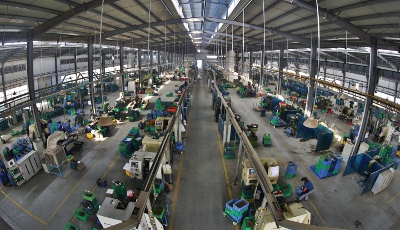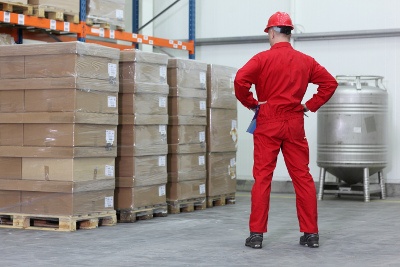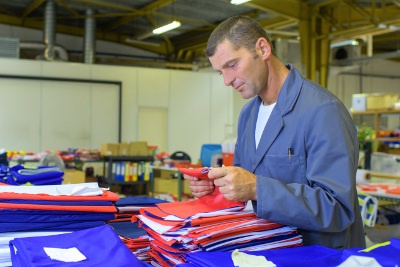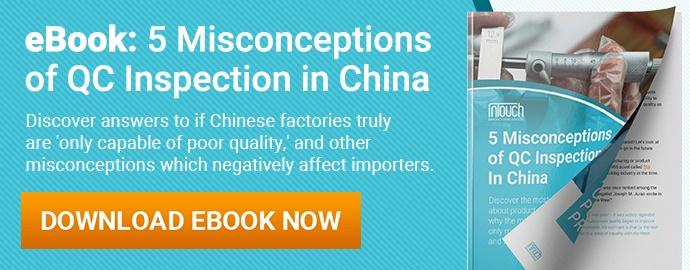 It’s a bit of an understatement to say that if you’re sourcing from China, you’re bound to encounter some bumps along the Silk Road. And one of the greatest frustrations importers report when working with Chinese suppliers is a challenge managing product quality.
It’s a bit of an understatement to say that if you’re sourcing from China, you’re bound to encounter some bumps along the Silk Road. And one of the greatest frustrations importers report when working with Chinese suppliers is a challenge managing product quality.
Outside product inspection, whether performed by your own staff or by a professional third-party, is generally regarded as a standard practice among importers of all kinds of products. You may be manufacturing furniture at a factory in Foshan, power banks at a factory in Shenzhen or industrial conduits at a factory in Raoping. Regardless of what you’re producing and where, you’ve probably considered hiring an inspection company to help you audit the factory or check the product before shipping.
But despite its wide acceptance, several common misconceptions of QC inspection in China persist in misleading otherwise competent importers. And one of the biggest misconceptions that’s held by new buyers and experienced importers alike is that the product inspection companies can impose their will on factories.
What are the limitations of an inspection company’s authority at the factory? When is more direct involvement from the importer required? And where does an inspection company provide value to the importer? Let’s explore answers to these questions and more to help you manage your product quality in China as effectively as possible, without hurting the relationship you have with your suppliers.
What inspection companies can’t do
Some importers are under the impression that inspection companies are a “silver bullet” that will solve any and all product quality issues they have. But while some can certainly help report product quality and provide the details necessary for informed decisions, there’s still a reasonable limit to their authority and capabilities. Becoming familiar with these limitations will help you set reasonable expectations and get the most benefit from QC inspection in China.
Forcibly schedule a QC inspection for a specific date
Importers often overestimate the ability of their inspection provider to schedule a service with their supplier. Sometimes factories will sign an agreement with an importer allowing for unannounced inspections and audits.  But in the vast majority of cases, visiting a factory to conduct an audit or product inspection requires coordination and prior approval from factory management.
But in the vast majority of cases, visiting a factory to conduct an audit or product inspection requires coordination and prior approval from factory management.
Having inspectors show up without approval can be detrimental to your relationship with your supplier and hinder future efforts to cooperate with the inspection company (related: 4 Keys to Smoothly Introduce Third-Party Inspection to Your Factory).
Factories ultimately hold the power to determine when a service happens. Third-party inspectors can’t simply barge into a factory unannounced and start poking around and asking questions.
Rather, an inspection company can request a date for inspection, as per the importer’s needs. But it’s always up to factory or supplier staff to confirm the inspection date. If you want an inspection performed on a certain date, you’ll generally need to contact your supplier directly and clarify this. Some importers find they need to repeatedly push their supplier to cooperate, in cases where that supplier is resistant to booking an inspection.
Fix product quality problems
Another limitation of inspection companies is their inability to actually address any issues found at the factory (related: Why QC Inspectors Rarely Work with Chinese Factory Staff to Fix Issues). Your inspectors will typically find and convey any nonconformities and other issues found to you in a comprehensive report. But rarely will your inspector be able to fix or address quality problems because:
- Outside inspectors don’t have the authority to force factory staff to take corrective or preventative actions or otherwise change their processes.
- Outside inspectors typically lack the technical background to be able to identify the root cause of a problem and suggest a reasonable solution.
Inspectors often have expertise in a particular product type, such as cosmetics or textiles. And they can sometimes suggest causes and solutions to simple QC issues. But their capability is typically limited to checking the product and reporting on it.
How to actually pinpoint causes for and address quality issues
Finding the root cause of a quality issue often requires the help of an engineer qualified to conduct a process audit. Process audits closely examine production processes to diagnose what’s causing particular problems. If you, your inspector and your supplier are unable to identify the cause of QC problems, you may want to consider a process audit.
If your inspector finds a problem that needs to be addressed following a service, you’ll generally need to discuss it with your supplier. Rarely can an outside inspector tell the supplier to fix a problem and reasonably expect that supplier to comply. Only the importer has the power to influence the supplier to treat problems seriously.
Gain full access to all areas of a factory
Some importers mistakenly think that once outside QC staff gain access to a factory for inspection they have free rein to visit and report on any area of the facility. But outside inspectors are guests at the factory.  While you and your inspector can request to see certain parts of the factory, the factory manager still has every right to deny that request.
While you and your inspector can request to see certain parts of the factory, the factory manager still has every right to deny that request.
Importers sometimes ask their inspection company to visit their supplier's factory under the guise of inspecting the product but with the true aim of secretly investigating some other parts of the facility. Not only can this damage the reputation of all those involved, but it’s usually highly impractical.
Factory staff often restrict inspectors to checking the product in a particular area within the factory, often insisting that a representative accompany them during the process. Aside from pulling a sample of goods from different parts of the warehouse, it’s rare that inspectors are allowed to freely visit other areas of a factory.
Withhold or authorize a shipment
Withholding or authorizing a shipment is a responsibility that importers sometimes misattribute to their inspection company. They often think the inspection result directly indicates whether the order is acceptable and that, by issuing a report with a passing result, their inspector has authorized the supplier to ship.  But regardless of inspections results, an inspection company doesn’t have the power to tell the factory to withhold or ship your goods.
But regardless of inspections results, an inspection company doesn’t have the power to tell the factory to withhold or ship your goods.
Depending on your requirements, you may clarify to your supplier that the inspection results “fail” or “pending” need your confirmation before an order can be shipped. But that confirmation ultimately needs to come from you as the customer, not from your outside inspection company. You know your customers’ product expectations better than both your supplier and your inspection team. So doesn’t it make sense that you’d be the judge of what’s acceptable or unacceptable to ship?
Threaten a factory with legal action
Although relatively infrequent, importers sometimes think their inspection company can bring legal action against their supplier over a shipment. But inspection companies typically have no legal power over factories. All potential legal action against the supplier over a shipment has to come directly from the importer or legal agent. As an outside third-party, the inspection company and supplier have no binding legal documents between them that can serve as the basis for litigation.
Suing a Chinese manufacturer can get complicated. The factory might even threaten to sue you. When dealing with such a sensitive matter, it’s typically best to seek professional legal counsel, rather than a third-party inspection firm to deal with the issue. While it’s usually too costly and difficult for most importers to take their Chinese supplier to court, larger companies may find it necessary.
What inspection companies actually do
You can think of inspection companies almost like a stoplight. Sometimes an inspection report will indicate a red, yellow or green light on an order.
But although your inspection team reports this result, ultimately, you’re the one in the driver’s seat. The decision to go ahead with shipping an order, waiting for more details or postponing it rests in your hands alone. Let’s look more closely at how inspection companies help you make an informed decision.
Identify and report any problems and nonconformities
When an outside product inspector enters a factory, their main aim is to report on the product using the same standards the importer would use, had they been inspecting the product themselves.  That could mean inspecting an order for garment defects and using the proper measuring method to report on dimensions. It could also mean properly reporting on flash in an order of injection-molded components.
That could mean inspecting an order for garment defects and using the proper measuring method to report on dimensions. It could also mean properly reporting on flash in an order of injection-molded components.
Whatever the product, you likely have a unique set of criteria you want your inspector to apply, which is best outlined in a QC checklist. Once issues are found, they’re compiled in a detailed report that gives you the details necessary to exercise sound judgment for your order. Combining the knowledge of your customers and market with the information found in your inspection report, you’re able to make an informed decision about shipping or holding an order.
Work with the importer to develop inspection standards
With intimate knowledge of your product, you probably have your own standards for checking it at the factory during inspection. But regardless, your inspection company can often bring their own experience with similar products and suggest on-site tests, checks and other processes relevant to your product. This is often helpful to importers who are familiar with the design of their product but are unfamiliar with the QC inspection process.
For example, you may know that blade strength is important for the ceramic knives you’re manufacturing. But you may not know how to properly test blade strength during inspection. If your inspection company has experience with similar products, their team can often suggest a standard and procedure for the testing. In this way, your inspection company can help you develop criteria and other aspects of a QC checklist so you have clearly defined method for checking your product.
Moderate certain aspects of the manufacturing relationship
The ability of inspection companies to moderate relations between importers and their suppliers is seldom understood and often underestimated. Even when talking to a Chinese supplier representative with an excellent proficiency in your native language, miscommunication often happens. Details can easily get lost in translation. And cultural differences can cause your supplier to misunderstand your product and needs.
 Inspection companies that employ bilingual, international staff that understand your language and the language of your suppliers can often mitigate these problems. This familiarity with you and your supplier on a cultural and language level is essential to avoiding small mistakes that can make a big impact (related: 3 Ways to Improve Communication with Suppliers).
Inspection companies that employ bilingual, international staff that understand your language and the language of your suppliers can often mitigate these problems. This familiarity with you and your supplier on a cultural and language level is essential to avoiding small mistakes that can make a big impact (related: 3 Ways to Improve Communication with Suppliers).
Just the simple act of copying your inspection company contact on emails with your supplier can help provide extra oversight to prevent your requirements from being misinterpreted. Your inspection provider can often alert you to potential “red flags” or help clear up any confusion before it becomes a major setback. As a result, you’re more likely to have a fruitful relationship with your supplier and fewer hassles.
Conclusion
Chinese suppliers don’t like getting pushed around–you’d be hard pressed to find any that do. When inspection companies try to impose their will on suppliers, that often creates barriers to cooperation because suppliers resent someone who isn’t their customer ordering them around. While pre-shipment inspection is an excellent means to improve product QC, there are limits to what outside inspection staff can do in factories.
Knowing what an inspection company can and can’t do ensures that you know where its responsibility ends and where yours begins. And with this knowledge in mind, you’ll get the most benefit from QC inspection, while improving the relationship you have with your Chinese supplier.
Have you seen consequences where an inspection company has overstepped their bounds? Share your experiences in the comments section below!







